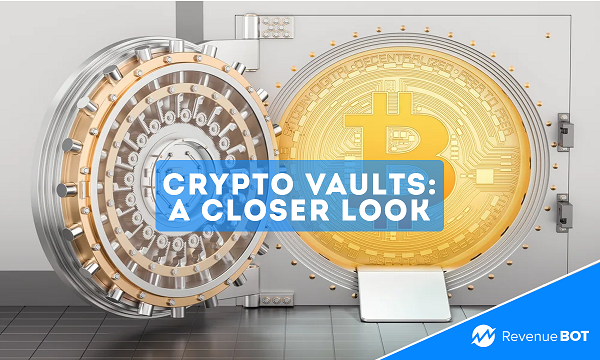
In the crypto space, each and every investor finds themselves faced with a question: how do you properly secure your digital assets? Most already know that crypto wallets exist, but not everyone knows that vaults do either. Both crypto wallets and vaults are the two main tools for storing and managing your crypto, each with their own unique features and benefits. In this article, we will discuss such things as crypto vaults, as well as look at how they actually differ from wallets.
Crypto vaults, explained
Vaults are an innovative means of securely storing cryptocurrencies and tokens, providing robust protection against online threats via multiple layers of security.
Moreover, crypto vaults represent a new frontier in securing digital assets, offering enhanced protection compared to traditional online wallets or exchange accounts. So, these are designed to shield you from online attacks. With multiple security mechanisms, including multisignature (Multisig) authentication, withdrawal delays and cold storage solutions, cryptocurrency vaults provide peace of mind for investors concerned about the safety of their holdings.
Many crypto vaults also implement cutting-edge encryption methods and require multiple authorizations in order to carry out transactions, thus boosting their security. Regardless of your background, a crypto vault can come in handy to keep your assets safe.
Types of crypto vaults
Smart-contract, time-locked, multisig and hybrid vaults are different from each other and offer varying approaches for storing your digital assets securely.
Smart contract vaults leverage blockchain technology to automate security measures through pre-programmed code, enhancing control and transparency. Time-locked ones introduce withdrawal delays to deter any spontaneous action and unauthorized access attempts. Both offer customizable security options for users.
As for multisignature vaults, these require multiple approvals for transactions, enhancing security through collaboration.
Hybrid ones combine ‘hot storage’ and ‘cold storage’ features, offering convenience for small transactions and robust security for larger holdings. This well-balanced approach meets diverse user needs with versatile security options.
How does a crypto vault work?
Cryptocurrency vaults embody secure algorithms and offline methods to protect digital assets in a variety of transactions, including deposits, transactions, and withdrawals.
By utilizing offline vaults and solid security protocols, crypto vaults alleviate the risks associated with online threats. The process typically starts with the user depositing cryptocurrencies from a hot wallet or exchange into the vault’s designated address.
Once deposited, the vault stores the cryptocurrencies securely, employing a combination of encryption protocols and multisignature authentication. This ensures that the assets are protected from unauthorized access and online vulnerabilities.
Should you make a withdrawal or initiate a transaction, the vault’s security mechanisms are activated. This may include smart contract execution, time-based delays or multiparty approvals.
Upon successful authorization and completion of any security mechanisms, the vault transfers the specified amount of cryptocurrency to the designated address.
Crypto wallet vs. crypto vault
These two concepts are quite distinct.
Crypto wallets, whether hot (online) or cold (offline), are primarily designed for regular transactions and managing smaller amounts of cryptocurrency. They ensure convenience and ease of use, allowing users to rapidly send and receive assets. However, their constant connection to the internet or potential vulnerability to physical theft makes them more susceptible to hacking and unauthorized access.
Crypto vaults, in contrast, are designed to maximize security and long-term storage of large amounts of cryptocurrencies using a multitude of security mechanisms. This makes them significantly more tamper-proof, phishing-resilient, among others. This option is ideal for those who value the security of their digital assets.
Advantages of crypto vaults
Crypto vaults offer enhanced security features that surpass those of typical wallets. Multisignature, for instance, requires approval from multiple parties, making unauthorized access a challenge.
Withdrawal delays create a time buffer that allows users to spot and potentially reverse fraudulent transactions. These sound security protocols provide an extra layer of protection for your digital assets, lowering the risk of loss due to hacking or theft.
The abovementioned issue as an unauthorized access is a major concern in the world of crypto, but crypto vaults are designed to mitigate this risk. By requiring multiple approvals and incorporating time locks, they create enormous obstacles for unauthorized individuals attempting to take over your assets.
The advanced encryption protocols used in such vaults further secure private keys and sensitive data, making it extremely challenging for hackers to compromise the security of the stored funds.
Thus, crypto vaults often provide offline storage options, such as cold storage wallets. This implies that the private keys and sensitive information related to users’ cryptocurrencies are not connected to the internet, eliminating a significant point of vulnerability and ensuring the security and integrity of cryptocurrency holdings.
How risky are these crypto vaults?
Crypto vaults, while secure, may have limited accessibility, technical complexity and risks associated with providers, recovery and fees. Their emphasis on security often results in reduced accessibility and control compared to regular wallets.
Withdrawals may require multiple approvals or time delays, making them less convenient for users needing lightning-fast access to funds. On top of that, the technical complexity of setting up and managing a vault can be a quite a challenge for some.
Another consideration is the risk associated with the vault provider. If the provider experiences security breaches, technical failures or bankruptcy, users’ assets could suffer an exposure. Recovering lost credentials or access to the vault can also be tough due to limited customer support or recovery mechanisms.
Hence, some providers charge fees, which users should consider when weighing the benefits of enhanced security against the costs and potential risks.
